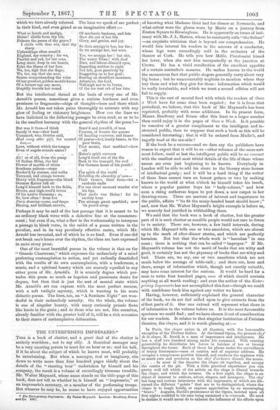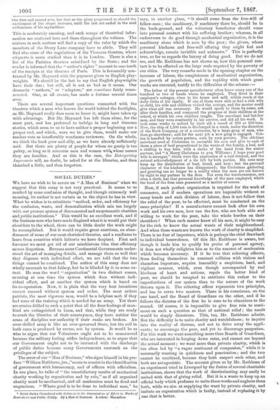THE ENTERPRISING IMPRESARIO.*
* The Entetprising Impresario. By Walter MAynard. and Co. 1867. This is a book of chatter, and a great deal of the chatter is entirely worthless, not to say silly. A theatrical manager may be a very amusing person to meet for an hoar or so ; and his talk, if it be about the subject of which he knows most, will probably be entertaining. But when a manager, real or imaginary, sits down to write more than four hundred pages chiefly about the details of the " starring tour " undertaken by himself and his company, the result is a volume of exceedingly tiresome twaddle. Mr. Walter Maynard, whose name stands on the title-page of this book, does not tell us whether he is himself an " impresario," or an impresario's secretary, or a member of the performing troupe. But whoever he may be, he seems to have enjoyed opportunities
of knowing what Madame Grisi had for dinner at Newcastle, and what colour were the gloves worn by Mario on a journey from Euston Square to Birmingham. He is apparently on terms of inti- macy with Mr. J. L. Hatton, whom he constantly calls "the Sultan" —an exquisite witticism that is beyond our comprehension. He would fain interest his readers in the sorrows of a conductor, whose legs were exceedingly cold in the orchestra of the theatre at Cork. He tells you how Mdlle. Piccolomini kissed her lover, when she met him unexpectedly at the junction at Crewe. He has a vivid recollection of the excellent appetite of a certain contralto's mamma. He makes known to the world the momentous fact that public singers generally carry about very big boxes ; but he unaccountably neglects to mention where they buy them and what they give for them : information which would be really invaluable, and which we trust a second edition will not fail to supply.
This is the sort of mental food with which the readers of Once a Week have for some time been regaled ; for it is from that periodical, we believe, that this book of Mr. Maynard's has been reprinted, probably with some additions. In its present form, Messrs. Bradbury and Evans offer this feast to a larger number
than could enjoy it in the pages of Once a TVeek. Is it possible to conceive of a greater compliment to the intelligent and in- structed public, than to suppose that such a book as this will be considered interesting ; that it will be ordered from bindle's, and eagerly read at the sea-side ?
If the book be a success—and we dare say the publishers have reason to expect that it will be so —other volumes of the same sort must follow, until at last the intelligent public will be an courant with the smallest and most trivial details of the life of those whose names are even just beginning to be known. Everybody in London will be able to add his share to the literary store houses of intellectual gossip ; and it will be a hard thing if the writer of these lines cannot turn an honest guinea or two by making known to the world at what o'clock he himself takes his lunch, where a popular painter buys his " body-colours," and how
soon a rising authoress hopes to put down a new carpet in her drawing-room. These are matters of interest and importance to. the public, affairs " 'tis fit the many-headed beast should know ;" and, now that Mr. Walter Maynard's bright example is before us, we scarcely feel justified in withholding them.
We said that the book was a book of chatter, but the greater part of it is such chatter as sensible people would not care to listen to in society. There are, however, a few lucid intervals, during which Mr. Maynard tells one or two anecdotes, which are almost up to the mark of after-dinner stories, and which are perfectly harmless. Not but that the whole work is " harmless " in one sense ; there is nothing that can be called " improper." If Mr. Maynard's volume has not the merit of books that are witty and good, it certainly has not the piquancy of books that are witty and bad. There are, we say, one or two anecdotes which are not much below the average of table-talk ; and there are, here and there, scraps of information which, though not exactly valuable,.
may have some interest for the curious. It would be hard for a, man to write four hundred pages, none of which should contain anything at all worth reading ; and even the author of the Enter-
prising Impresario has not accomplished this feat—though we could with confidence back him against any writer we know.
Having, however, sufficiently.explained the general character of the book, we do not feel called upon to give extracts from the silliest parts of it. Our one extract will represent what there is. of information in the volume before us. It is the most favourable specimen we could find ; and we have chosen it out of consideration for our readers. It relates to that singular institution of Parisian theatres, the claque, and it is worth glancing at :-
In Paris, the claque exists in all theatres, with the honourable exception of the Theatre Italian. At the Grand Oprea, the present chef de la claque, M. David, is a man of importance and intelligence. He has a staff two hundred strong under his command. With cunning, generalship he distributes his forces in batches of ten or twenty throughout the house. Each of these he places under the surveillance of trusty lieutenants—men of caution and of superior address. He occupies a conspicuous position himself, and conducts the applause with as much care and precision as the chef d'orchestre directs the music.. In most of the theatres the claque sit together, and occupy the centre of the pit. With a little practical experience you can pretty well tell which of the artists on the stage is liberal towards. the claque, and which tho reverse. On a first night, the claque is an object of interest to authors, actors, singers, and managers. The chef has long and serious interviews with the impresario, at which are dis- cussed the different "points " that are to be distinguished, where the claque is to laugh loudly, or express approbation by an encouraging "bravo." Auguste, David's predecessor at the Opera, insisted upon all Loudon: Bradbury, Evans first nights confided to his care being sustained a In crescendo. He used 1 to declare it would never do to exhaust the influence of hie efforts upon
the first and second acts, but that as the piece progressed so should the • excitement of the claque increase, until the last act ended in the mad .enthusiasm of his myrmidons.
This is moderately amusing, and such scraps of theatrical infor- mation are scattered here and there throughout the volume. The
• curious in such matters will find a copy of the rules by which the members of the Drury Lane company have to abide. They will find also some of the regulations of the Viennese theatres, where -etiquette is more studied than it is in London. There is also a list of the Parisian theatres subsidized by the State ; and the reader is informed that the " author's rights " amount to one-tenth .of the receipts at the theatres of Paris. This is favourably con- trasted by Mr. Maynard with the payment given to English play- wrights. We should be the last to say that English playwrights "have their due ; but still, all is riot so bad as it seems. Our dramatic " authors," or " adapters," are sometimes fairly remu- nerated. One, at all events, has made a fortune several times -over.
There are several important questions connected with the theatres which a man who knows the world behind the footlights, as Mr. Maynard really does seem to know it, might have taken up with advantage. But Mr. Maynard has left them alone, for the most part, and has preferred to indulge in long and tiresome stories, which seem to us to have neither a proper beginning nor a proper end, and which, were we to give them, would make our readers vote us insufferably wearisome reviewers. On the whole, we think the book poor and silly, as we have already sufficiently said. But there are plenty of people for whom no gossip is too paltry, so long as it concerns men and women with, whose names they are familiar. And as this is the case, the Enterprising Impresario will, no doubt, be asked for at the libraries, and then thumbed a little, and then forgotten.































 Previous page
Previous page